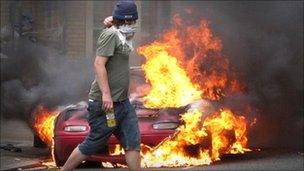New gangs forming in jails after riots, watchdog warns
- Published

The prison population is at a record high after the riots
New gangs are forming in jails because of the influx of people charged over last month's riots, the prisons watchdog for England and Wales says.
Nick Hardwick said gang activity was growing, with more young people joining for their own protection.
He said there had been a significant rise in young people on suicide watch, some of them new inmates but also those moved to make way for them.
He said prison staff had worked hard to avert "potentially serious incidents".
The latest figures show that that some 1,700 people have appeared in court in relation to the rioting and looting. Almost 900 of them have been remanded to jails pending trial. A total of 176 people - 26 of them juveniles - have been convicted and given a custodial sentence. The prison population is at a record high of almost 87,000.
Launching his annual report, external, the chief inspector of prisons said his team had looked at some of the key jails and young offenders' institutions housing the new convicts and those held on remand.
He said that prison service staff were seeing changes in gang activity with some young people joining up despite having no previous involvement. The key motivation appeared to be self-protection as the established prison population turned on newly-arriving inmates.
"Some young people who did not have gang affiliations have been joining inside," said Mr Hardwick.
Nick Hardwick: "They wanted the protection of being in a group"
"Staff have worked hard to keep people with existing gang affiliations apart and generally that's been successful. But new gangs are establishing."
New gangs were forming where a large group of offenders had been moved from a prison in one region to another because of the population pressures.
Members of London's rival "postcode gangs" who had been relocated had been putting differences aside to create city-wide groups when confronted by offenders in institutions further north.
Serious incidents
Some of the worst tensions had been at Feltham Young Offenders Institution and Brixton Prison, both in London.
A gym at Feltham was damaged and some inmates got into a roof-space. At Brixton, inmates refused to go back into cells. Neither of the incidents led to serious injury.
"I think that it is a credit to the staff that there has not been worse trouble," he said.
On Tuesday, Justice Secretary Ken Clarke told MPs, external that "sufficient capacity" exists in the prison system to cope with the riots.
But Mr Hardwick said that although the "mechanics" of the prison service had coped so far, it had inevitably become harder to maintain normal prison regimes, with education programmes suffering.
"Up to now, they have had the capacity to physically absorb the additional numbers," said Mr Hardwick. "But capacity is more than just a question of how many prisoners can be squeezed into the available cells."
He said that Mr Clarke's plans to radically overhaul rehabilitation and resettlement had not yet got off the ground and it was time for a "rocket" to be put under them.
A Ministry of Justice spokesman said: "Gang affiliations are not necessarily reflective of gang membership in the community.
"Where they exist, gangs are managed within the broad security and control frameworks that apply to all prisoners."
But shadow justice secretary Sadiq Khan said: "The public expect prisoners to be punished and reformed in prison, not recruited into gangs.
"Prison and probation officers have an important role to play in prisoners' rehabilitation, but we are seeing thousands of frontline job losses in the prison and probation services."
- Published9 September 2011
- Published16 August 2011